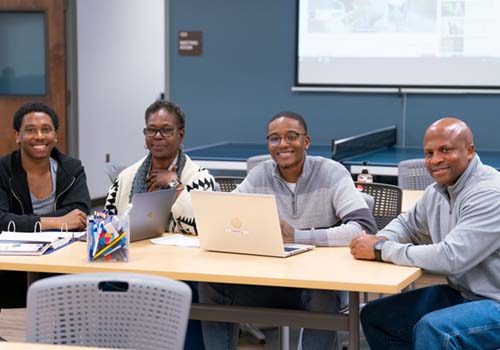
By Luciana Chavez Special to Merced College
In linguistic terms, “Umoja” is a Kiswahili word that means unity.
In Merced College terms, “Umoja” is the name of a program that has been coming to life in 2021-22.
The Umoja Program at Merced College will give African American students a community of teachers, mentors and elders, and instruction specific to their life experience as Black people, to both ground and uplift them during their academic journey.
“Each of the [program elements] will be aligned with Umoja principles, and be meaningful to students’ life experience,” said Louis Foy, Merced College Assistant Director of the Equity & Diversity Center, who is coordinating the group.
“The approach helps them build healthy relationships. The beautiful thing is it is geared for African Americans, but you don’t have to be African American to take part.”
Inside Higher Ed wrote in September about startling student population data from during the pandemic from the National Student Clearinghouse Research Center.
They showed rapidly declining enrollment and graduation rates among Black students and Black men in particular, with the worst numbers (down 21.5%) among Black men matriculating at community colleges. Merced College’s African American students made up 3.25% of its population in 2020-21.
Elijah Martin, 21, a sophomore fitness and nutrition major, had experienced some obstacles. He had to drop out after 2018 and came back in Fall 2021.
“Once Coach Foy told me about the Umoja program, I said, ‘Let’s get students in here right now,’” said Martin, who will transfer to Fresno State in the fall. “Anything we can do to make sure African American students know people here care about their struggles will work.”
Merced College will be the 58th of 116 California Community Colleges to offer Umoja. The organization, originally founded by volunteers, has doubled in size from 27 to 57 campuses since the CCC Chancellor’s Office (CCCCO) began offering $1 million in annual funding in 2015. That increased to $2.5 million in 2018.
The Umoja Program at Merced College currently exists as an advisory committee. It will eventually include a cohort of culturally relevant courses, staff counselors and community elder mentors.
Anthony Robinson, Region 1 Coordinator of the Umoja Community in Sacramento, said it takes four years to prop up all facets on a campus—recruitment, training instructors, and building a network of elders and mentors. But it’s obvious Merced College is ready for it.
“Especially for a new program like Merced, recruiting, marketing and visibility are the biggest challenges,” Robinson said. “For the most part, once a student finds out Umoja exists, they jump to it.”
Getting the word out about Umoja is especially important with most colleges stymied by the ongoing pandemic and not yet ready for all students to return. Communications Studies Professor Lee Anne Hobbs, a 22-year veteran at Merced College and Umoja advisory board member, said the first step has been to recruit heavily among local high schools.
“Recruiting in the community, rather than just at Merced College, will allow us to really put [Umoja] in motion,” Hobbs said.
“We use the phrase ‘a safe environment.’ Given everything else that goes on in their lives in the outside world—obstacles and biases—when they get into a classroom that revolves around their life experience, they can then take a deep breath and focus on coursework.”
Foy will also grab family members to take part.
“With our Umoja elders, we’re able to not just reach students,” he said. “But involving their parents and older people like grandparents, to share their past with our students, will be important.”
No one should be taken aback that it will take four years for the Umoja Program to blossom. As students go through the program, Foy said they develop pride in, ownership of and responsibility to their community, which also nurtures new leaders.
Foy is currently grabbing faculty to teach the five courses that the Umoja cohort will take—English 1A, English 86AC, Math 10, Math C and Guidance 30.
Instructors will begin Umoja training this summer. They might be ready to offer the cohort for Fall 2022, but Foy said Spring 2023 “is more realistic.”
“Anthony is always telling us to take our time … so, by year 4, we’re good to go,” Foy said. “It has been quite a beautiful thing to see. Everyone is on board. We have had nothing but great support on campus putting this together. And when we get there, it will be cool.”
